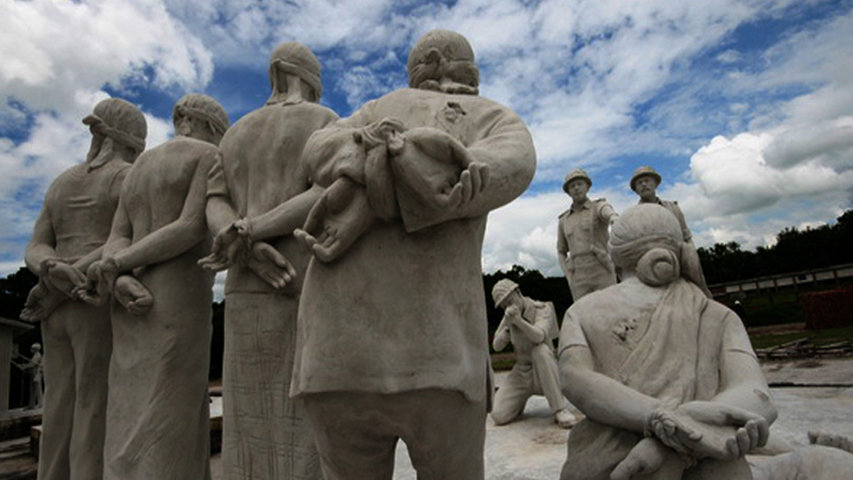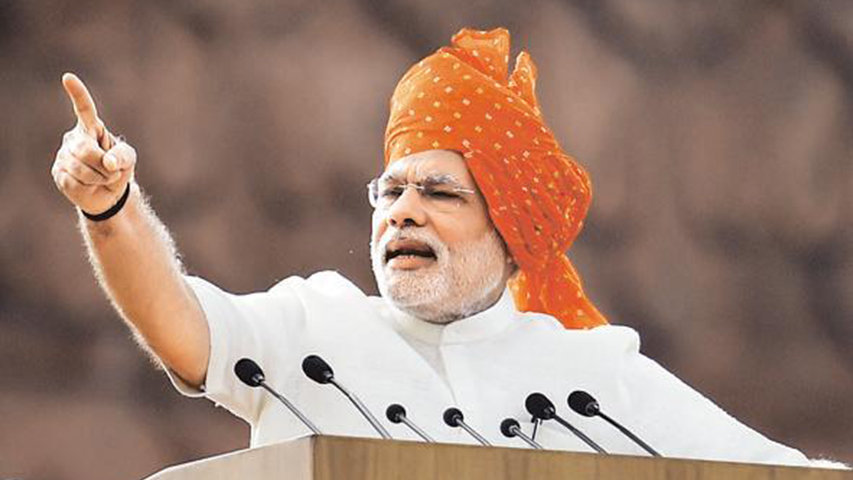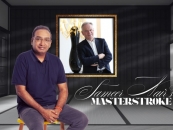
Why being an Intellectual has become risky in Modi's India
by Gautam Benegal August 7 2018, 3:45 pm Estimated Reading Time: 10 mins, 25 secsIt is difficult to draw the line between an 'ordinary' citizen questioning the fate of his tax money in a tea shop and an 'intellectual' who does the same through writing.
Where does one draw the line between a so-called ordinary person and an "intellectual"? To be an intellectual does one have to have a pedagogical background, various academic qualifications, shelves creaking with tomes, or can one simply be a thinking person, with an inquiring mind and a certain argumentativeness that comes with it?
When the Prime Minister Narendra Modi contemptuously dismissed academics by trying to make the distinction between "Harvard and hard work" in March 2017, he may not have been aware of it but he was repeating a very familiar trope that totalitarian regimes have been following since ancient times. China is a notable example.
The distrust of scholars and scholarly works is not new. The burying of scholars and burning of books by Qin Shi Huangdi, the first emperor of China, was probably the first naked use of state power against knowledge and its bearers. Mao did something similar in the Cultural Revolution (1966-76). Placing all intellectuals at the bottom of the "Stinking Number Nine", (landlords, rich peasants, counter revolutionaries, moral degenerates, rightists, renegades, enemy agents, capitalist roaders and intellectuals), he mobilised high school and university students known as Red Guards to humiliate and torture teachers and scholars.
_thedailyeye.jpg)
Cultural Revolution in China (Newyorker.com)
Claiming that "the more knowledge a man had, the more reactionary he would become," Mao also had millions of "educated youth" (Xi Jinping was among them) sent down to the countryside to receive "re-education" from the peasants.
When Deng Xiaoping was rehabilitated in the late 1970s, his aim was to reverse Mao's anti-intellectualism in order to accomplish his modernisation agenda. Under Deng, the college entrance exam was resumed and intellectuals were reclassified into the politically correct "working class". Yet the transition from a planned economy in the early 1980s, with its emphasis on "let some people get rich first," generated a situation in which "those who produce missiles earn less than those who sell tea eggs". Frustration over this payment hiatus between physical work and mental work, coupled with the prevailing view that knowledge and education were useless, fuelled the 1989 pro-democracy movement.
In the post-1989 era, an anti-intellectualist agenda was followed in a subtler way. By encouraging intellectuals to benefit personally and professionally from China's robust economic development, the state successfully co-opted a large number of intellectuals, including those who were at the vanguard of criticising and challenging the regime in the 1980s.
Indeed, much like what we are noticing in India today, the temptation to advance in political rank and accrue economic benefits by way of grants and other perks, many overseas Chinese scholars internalised the official rhetoric and became staunch defenders of the status quo. The explosive growth of market forces further undermined intellectual influence. Money worship, in conjunction with the unemployment problem caused by the great leap forward towards mass education since 1999, led to the emphasis on those "practical" subjects (e.g., business and finance) at the expense of subjects that value thinking and intellectual pursuit. In 2011, among the 5,000 graduates of a top university in southeast China, only three were from philosophy department, which led to the calls to abolish the major.
In Soviet Union, within the first decade after the Revolution of 1917, the Bolsheviks generally scorned and suspected the educated as potential traitors to the cause of the proletariat. Both the core of the Communist Party and people who became local activists and officials in government and industry often lacked at least formal education and disdained those who had it. Lenin once called the intelligentsia, particularly those who opposed him, "rotten" and "shit".
_thedailyeye.jpg)
Bolshevik Leader Vladimir Lenin addressing a rally (ploiticaexterior.com)
The boast, roughly translated as "we ain't completed no academics" became a catchphrase for the new ruling elite. Former members of landed classes were classified as "Lishentsy" and their children were denied access to education. In 1922, a large group of Russian intellectuals were exiled on the so-called Philosophers' ships. Prominent among them was the Russian philosopher Nikolai Berdyaev, but the arrests targeted a wide array of thinkers, including "philosophers, economists, sociologists, scientists, journalists and other intellectuals". The majority of those singled out by the GPU were not active counter-revolutionaries, but people who had intellectual differences with the Bolsheviks' government plan.
Later on, exactly like the Chinese, the Soviet government too came to see education as important and dedicated great resources to literacy on the one hand, and higher and professional education on the other.
However, as a matter of social policy, the government sought to promote the working class over the intellectual elite. Industrial workers often received greater salaries than university-trained professionals such as teachers, doctors, and engineers. Workers were indoctrinated with the notion that only manual labour creates real value in the economy, whereas educated people just sit around writing papers.
Adolf Hitler distrusted university professors and lecturers as he knew that by the very nature of their academic excellence they could resist Gleichschaltung (the coordination of the German population to do as the government wished so that they all thought in the same way).
Nazi anti-intellectualism was demonstrated on May 10, 1933, when the principal German student body organised students for a book-burning festival. In university towns, students consigned to the flames books written by prominent Jewish authors, including those by Hellen Keller, that were considered a threat to the Germanic spirit.
_thedailyeye.jpg)
Nazi Book Burning (YouTube)
Here is an eyewitness account by Louis P Lochner, head of the Associated Press Bureau in Berlin, at that time:
"Here the heap grew higher and higher, and every few minutes another howling mob arrived, adding more books to the impressive pyre. Then, as night fell, students from the university, mobilised by the little doctor, performed veritable Indian dances and incantations as the flames began to soar skyward. When the orgy was at its height, a cavalcade of cars drove into sight. It was the Propaganda Minister himself, accompanied by his bodyguard and a number of fellow torchbearer of the new Nazi Kultur."
"Fellow students, German men and women," he said as he stepped before a microphone for all Germany to hear him.
"The age of extreme Jewish intellectualism has now ended, and the success of the German revolution has again given the right of way to the German spirit.., You are doing the right thing in committing the evil spirit of the past to the flames at this late hour of the night. It is a strong, great, and symbolic act - an act that is to bear witness before all the world to the fact that the spiritual foundation of the November Republic has disappeared. From the ashes there will rise the phoenix of a new spirit... The past is lying in flames. The future will rise from the flames within our own hearts.... Brightened by these flames our vow shall be: The Reich and the nation and our Fuehrer Adolf Hitler: Heil! Heil! Heil!"
The few foreign correspondents, who had taken the trouble to view this 'symbolic act', were stunned. What had happened to the "Land of Thinkers and Poets?" they wondered.
The Third Reich promoted a subjective view of science that rejected theoretical ideas. Because of the disproportionate number of Jews in science, the Nazis associated modern science with the Jewish people. The Nazis dismissed hundreds of Jewish and Aryan scientists who practised theoretical science. Many also left their institutions and Germany on their own volition. The Nazi Civil Service Law of 1933 had set in motion events that led to the downfall of German science and contributed significantly to Germany's eventual destruction in 1945.
When the Khmer Rouge, established their regime as Democratic Kampuchea (1975-1979) in Cambodia, in their anti-intellectualism and zeal to establish agrarian socialism, they emptied cities to purge the Khmer nation of every traitor, enemy of the state, and intellectual. Even wearing spectacles could get people killed as "intellectuals."

A sculpture in Meherpur showing the execution of intellectuals in Bangladesh
Closer to home, in 1971, the Bangladesh massacres are fresh in the collective memories of Bengalis. On December 14, 1971, the Pakistan army let loose the paramilitary units al-Badr and al-Shams to exterminate Bengali intellectuals. Their goal was to hunt out and kill Bengali political thinkers, educators, doctors, scientists, poets, artists, journalists, lawyers, and other intellectuals. The al-Badr and al-Shams fanned out with lists of names to find and execute the core of Bengali intellectuals. The intellectuals were arrested and taken to Rayer Bazaar, a marshy area in Dhaka city where they were gunned down. Others were herded into Dhaka University and executed.
Here's an eyewitness account of a journalist, Simon Dring, who managed to escape:
"Led by American-supplied M-24 World War II tanks, one column of troops sped to Dacca University shortly after midnight. Troops took over the British Council library and used it as a fire base from which to shell nearby dormitory areas.
"Caught completely by surprise, some 200 students were killed in Iqbal Hall, headquarters of the militantly anti-government students' union, I was told. Two days later, bodies were still smouldering in burnt-out rooms, others were scattered outside, more floated in a nearby lake, an art student lay sprawled across his easel."
In November 2015, at the time when prominent writers, artists and filmmakers, were returning their national awards in protest against the spate of assassinations of activists, PM Modi himself posed for pictures with organisers of a Delhi demonstration against protesting writers, where slogans such as: "Hit the fraudulent literati with boots" and, "Presstitutes suck up to Europeans" were raised. Culture minister Mahesh Sharma said, "If they say they are unable to write, let them first stop writing. We will then see."
Today, as a Karnataka MLA, Basanagouda Patil Yatnal brands liberals and intellectuals "anti-national" and says, "I would have got intellectuals shot if I was the home minister," in a state where MM Kalburgi and Gauri Lankesh have been gunned down by confirmed Hindutva kill squads, one recalls the words of this song, "When I hear the word 'culture', that's when I reach for my revolver" from the band Mission of Burma written and sung by Clint Conley. It is a loose translation of "Wenn ich Kultur höre ... entsichere ich meinen Browning!" from the play Schlageter, written by Hans Jost, a member of the officially approved Writer's Association in the Third Reich.
But where does one draw the line between an "ordinary" citizen asking valid questions and discussing the government which he has elected, and the fate of his tax money, along with others, say, in a tea shop - like millions do in our country — and an "intellectual" who does the same in a publication?
Where does that bullet find its mark?

Prime Minister Narendra Modi
An intellectual is a very bad thing to be when everyone else is moving in step around you or if the administration thinks you are a problem. A thinking person is a very bad thing to be. The ideology of the regime is irrelevant whether it is Pol Pot's Cambodia, or Stalin's USSR or Nixon's USA, or Modi's India. Mockery, denigration, disparagement of anyone saying something the slightest bit layered that goes beyond the surface of popular assent and approval is immediately met with hostile ferocity that was not present a few years ago. Even educated people who would understand a few years ago deliberately dumb down and pretend not to understand a complex thought with nuances. That is how it all begins. Today, the world over, anti-intellectual proclivity is heightened by technological revolution and widespread use of social media. Inundated by information, people mistakenly equate information flows to knowledge flows, and further deride formal education while emphasising utilitarianism.
But there's something else people need to realise. There is no sharp dividing line between a devious intellectual and an honest virtuous "Ordinary Joe". There is no limit to dumbing down and there is no one saying, "Ok, we'll dumb down to this extent and no further." This is a slippery slope. Today's scoffers are also educated. They may be the target of tomorrow's version of 2.0 Dumb Downman. Very soon, even the presence of books in your house or a slip of the tongue might provoke your more successful cretinised peers to herd you into that town hall.
(As first published in DailyO - https://www.dailyo.in/variety/basanagouda-patil-yatnal-intellectuals-freedom-of-speech-third-reich-narendra-modi-adolf-hitler/story/1/25748.html)




-173X130.jpg)
-173X130.jpg)
-173X130.jpg)
-173X130.jpg)

-173X130.jpg)

-173X130.jpg)